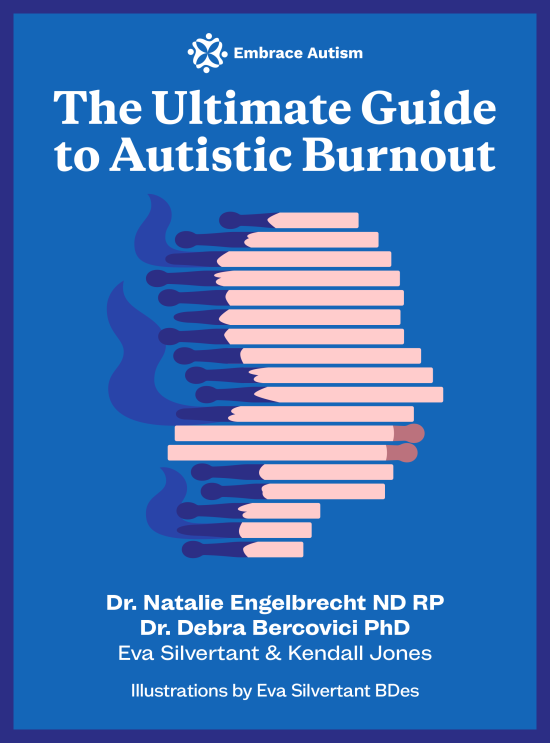Embrace-Autism.com
trusted by medical providers & autistics everywhere
— By autistics, for autistics —
through an international team of autistic
and AuDHD psychologists and doctors.
Join us!
Stay up to date with our latest posts &
news by subscribing to our mailing list
Hello!
We are Dr. Natalie Engelbrecht ND RP, an autistic naturopathic doctor, registered psychotherapist, and an autism researcher with a Masters of Science in Applied Psychology (cum laude); and Eva Silvertant, an AuDHD, award-winning graphic designer, illustrator, type designer, and autism researcher, with a Masters
in Psychology in completion (2025)
You might call us an Autism Spectrum Duo!
Embrace Autism is our effort to bring you research
and experience-based autism content; to help you
better understand yourself, empower yourself, embrace
your advantages, and overcome your challenges
Look at the About page to learn more about
who we are and what our mission is
Explore our website and browse our blog
to start learning more about yourself
or your loved one!
Autism Spectrum Difference:
A neurodevelopmental difference characterized by alterations in social functioning, hypersensitivity to stimuli, repetitive behaviors, and deep interests—often combined with advanced cognitive & perceptive abilities
Q&A
What is autistic
savant syndrome?
Savant syndrome is a condition characterized by mental disabilities combined with exceptional abilities—usually related to memory. Although rare, a disproportionate 1 in 10 autistic people are savants! Read more
Is there a link between autism
and giftedness?
A link has been found between autism and high intelligence; estimated rates of intellectual giftedness in autistic children is 0.7–2%, compared to up to 1% in the general public. Some researchers regard autism as a “disorder of high intelligence.” Read more
Are autistic
females rare?
Autistic females are not actually rare. But since autism presents differently in females, many are misdiagnosed or remain undiagnosed. What was thought to be a 4:1 male-to-female ratio of autism, is now predicted to be closer to 2:1—possibly even 1:1! Read more
Do autistic people
lack empathy?
It is a damaging myth that autistic people lack empathy. We can be highly empathetic, but may not always sense the socially appropriate way to communicate it. Additionally, displays of empathy may be delayed until a situation is made salient to us. Read more
Why is routine important
to autistic people?
Routine provides a framework to make things controlled and manageable; it gives us something we can rely on in a predominantly unpredictable world. An interrupted routine can disrupt our entire schedule, as we have to reconsider/reassess everything. Read more
What is an autistic meltdown & shutdown?
When we are triggered by social stress, a meltdown can ensue, which can resemble a tantrum. A shutdown is a response to social triggers or sensory overload, after which the person becomes unresponsive, and has to rest in order to recharge. Read more
Embrace Autism
affects my life, other autistic people,
and people’s perceptions of autism.
Embrace Autism
I can EMBRACE who I am;
or I can REJECT who I am
I can see myself having STRENGTHS;
or I can see myself having SYMPTOMS
I can TAME my Kryptonites;
or I can DROWN in my challenges
I can CHERISH my uniqueness;
or DISOWN my peculiarities
I can UTILIZE my cognitive abilities;
or let my sensitivities OVERPOWER me
I can see what is GREAT about who I am;
or I can LOATHE who I am
How I choose to perceive myself affects my life, other autistic people, and people’s perceptions of autism.
Highlights
Below is a selection of articles from our autism blog.
Have a read to get a taste of the content we offer!
Alexithymia
Alexithymia or emotional blindness is so common among autistics (40–70%) that
it’s commonly mistaken for autism itself.
Find out what alexithymia is and how it presents itself in autism. Read more
Overwhelm
Autistic people can get overwhelmed at times. Here I describe my experience of
3 types of overwhelm relating to autism:
a sensory overload, a meltdown,
and a shutdown. Read more
Meltdowns
To remain regulated and functioning,
we need to be able to dissipate stress.
When this is not done effectively, it can have an explosive result, leading to a meltdown
or a (consequent) shutdown. Read more
PTSD
PTSD is very common in autism,
as the autistic brain has difficulty
bringing information from one hemisphere
to the other, which makes it difficult to
process trauma. Read more
